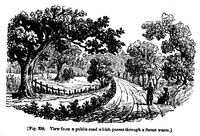FRAGMENT XXXII. CONCERNING IMPROVEMENTS. I HAVE frequently been asked, whether the improvement of the country, in beauty, has not kept pace with the increase of its wealth; and, perhaps, have feared to deliver my opinion to some who have put the question. I now may speak the truth, without fear of offending, since time has brought about those changes which I long ago expected. The taste of the country has bowed to the shrine which all worship; and the riches of individuals have changed the face of the country. There are too many who have no idea of improvement, except by increasing the quantity, the quality, or the value of an estate. The beauty of its scenery seldom enters into their thought: and, What will it cost? or, What will it yield? not, How will it look? seems the general object of inquiry in all improvements. Formerly, I can recollect the art being complimented as likely to extend its influence, till all England would become one landscape garden: and it was then the pride of a country gentleman to shew the beauties of his place to the public, as at Audley End, Shardeloes, and many other celebrated parks, through which public roads were purposely made to pass, and the views displayed by means of sunk fences. Now, on the contrary, as soon as a purchase of land is made, the first thing is to secure and shut up the whole by a lofty close pale, to cut down every tree that will sell, and plough every inch of land that will pay for so doing. The annexed two sketches [figs. 239 and 240] serve to shew the effect of such improvement; they both represent the same spot; formerly, the venerable trees marked the property of their ancient proprietor; and the adjoining forest, waste, or common, might, perhaps, produce nothing but beauty; now the trees are gone, the pale is set at the very verge of the statute width of road, the common is enclosed, and the proprietor boasts, not that it produces corn for man, or grass for cattle, but that it produces him rent: thus money supersedes every other consideration.



